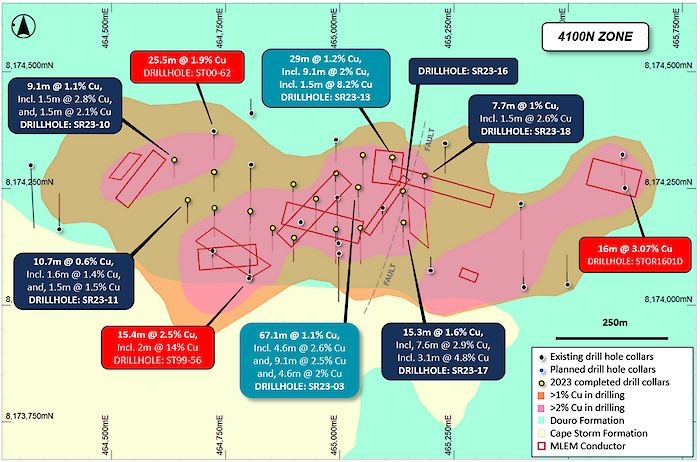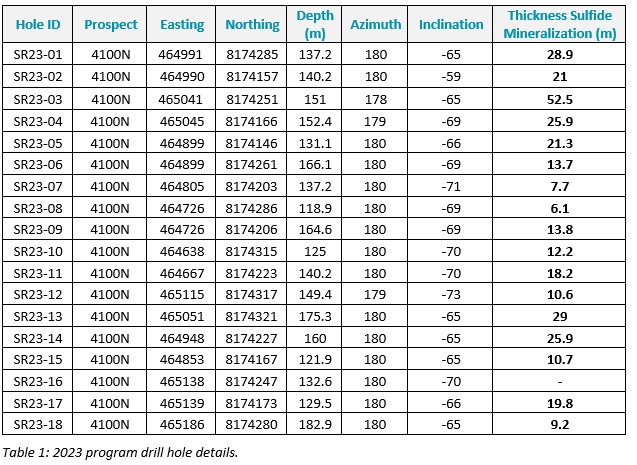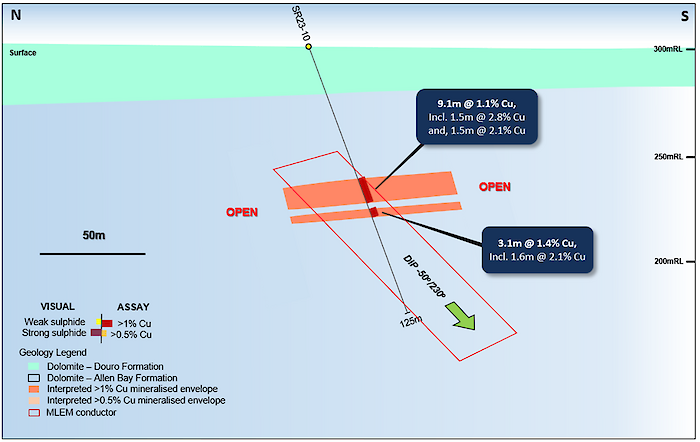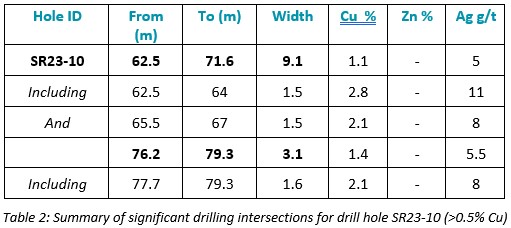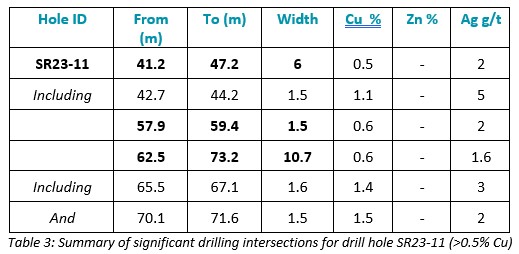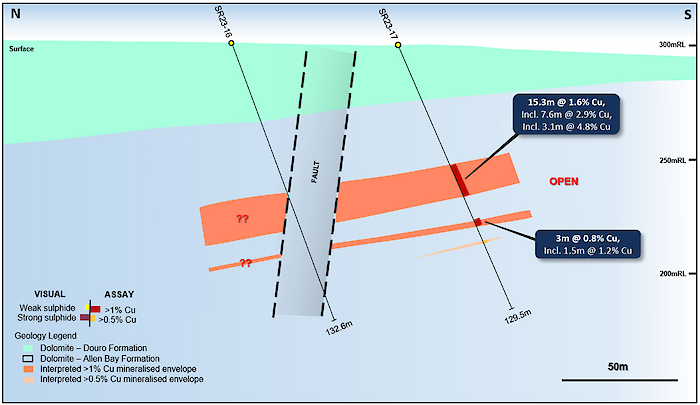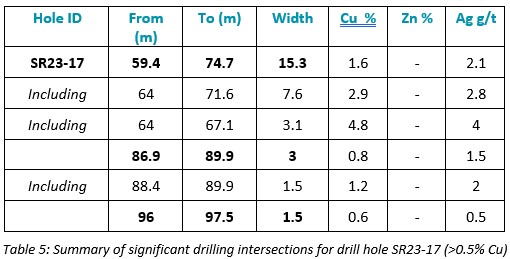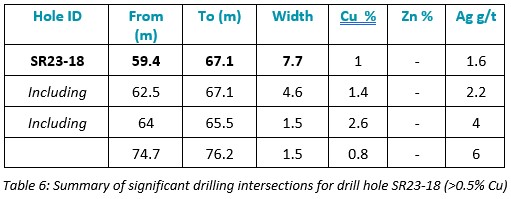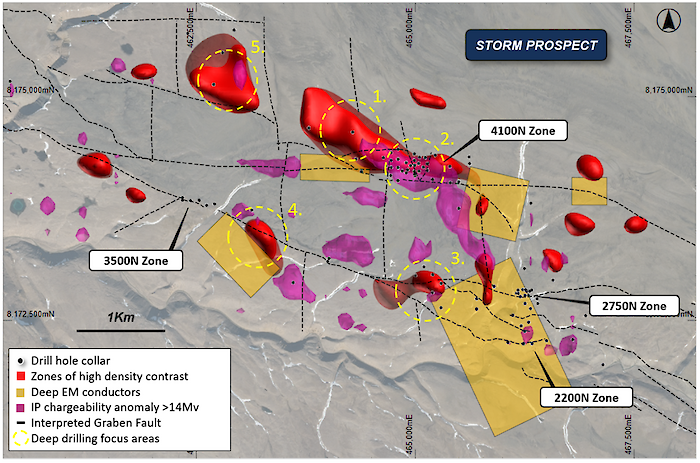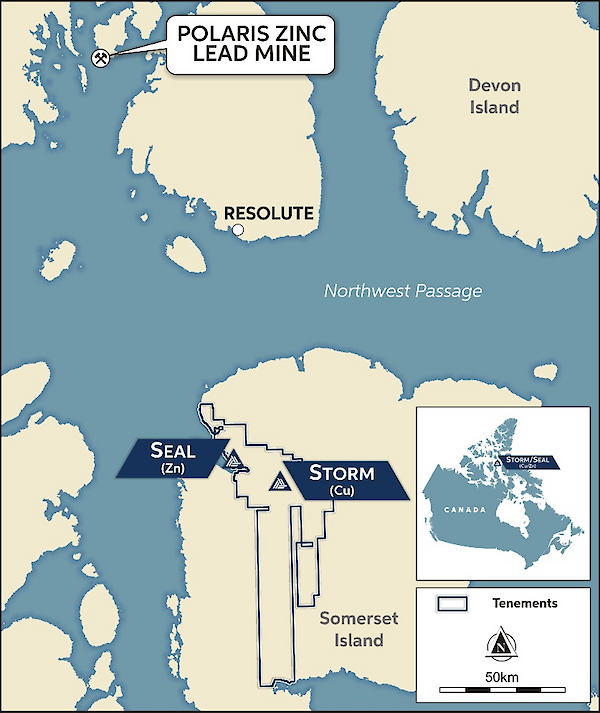News
Aston Bay and American West Metals Announce Additional Copper Intercepts and Commencement of Summer Drilling Program at the Storm Copper Project, Canada
- Assays confirm further thick and high-grade near-surface copper intervals at the 4100N Zone
- Drill hole SR23-17 has intersected:
- 15.3m @ 1.6% Cu from 59.4m, including,
- 7.6m @ 2.9% Cu from 64m, including,
- 3.1m @ 4.8% Cu from 64m
- 7.6m @ 2.9% Cu from 64m, including,
- 15.3m @ 1.6% Cu from 59.4m, including,
- Drill hole SR23-10 has intersected:
- 9.1m @ 1.1% Cu from 62.5m, including,
- 1.5m @ 2.8% Cu from 62.5m, and,
- 1.5m @ 2.1% Cu from 65.5m
- 3.1m @ 1.4% Cu from 76.2m, including,
- 1.6m @ 2.1% Cu from 77.7m
- 9.1m @ 1.1% Cu from 62.5m, including,
- Drill hole SR23-12 has intersected:
- 7.6m @ 1.1% Cu from 106.7m, including,
- 3.1m @ 2.1% Cu from 109.7m
- 7.6m @ 1.1% Cu from 106.7m, including,
- Drill hole SR23-18 has intersected:
- 7.7m @ 1% Cu from 59.4m, including,
- 4.6m @ 1.4% Cu from 62.5m, including,
- 1.5m @ 2.6% Cu from 64m
- 4.6m @ 1.4% Cu from 62.5m, including,
- 7.7m @ 1% Cu from 59.4m, including,
- Drill results continue to expand the footprint of copper mineralization at the 4100N Zone, which remains open laterally in all directions
- Reverse circulation (RC) delineation drilling has recommenced at the 4100N Zone
- Diamond drilling will commence shortly to test the large gravity anomalies located below the high-grade near-surface deposits
- American West has been granted funding by the Nunavut Government to support exploration and drilling at Storm
Aston Bay Holdings Ltd. (TSXV: BAY) (OTCQB: ATBHF) ("Aston Bay" or the "Company”) reports significant new drill results from the spring reverse circulation (RC) drilling program and recommencement of drilling activities at the Storm Copper Project (“Storm” or the “Project”) on Somerset Island, Nunavut, Canada. The program was conducted this April and May by American West Metals Limited (“American West”), who are the project operator since entering an option agreement with Aston Bay in March 2021.
“Further impressive results from the spring RC program continue to expand the footprint of near-surface copper mineralization at Storm,” stated Thomas Ullrich, CEO of Aston Bay. “The program conducted by our partners America West has outlined a significant system over 1.3 kilometres long and 300 metres wide at the 4100N Zone alone. More drilling on the zone is now underway and further delineation drilling at other zones is planned for later this summer.
“Diamond drilling of the large geophysical targets below the 4100N Zone will also begin soon. Geological and geophysical modeling point to a sediment hosted copper system, the type of mineralization responsible for the very large and high-grade copper deposits of central Africa. The potential for discovery is enormous here, making this one of the most exciting drill programs of the summer.”
Figure 1: Plan view of the 4100N Zone showing interpreted copper mineralization footprint
(defined by drilling, MLEM and VTEM), historical and recent drilling details, overlaying regional geology.
Stated drill hole intersections are all core length, and true width is expected to be 60% to 95% of stated length.
COPPER MINERALIZATION OPEN LATERALLY IN ALL DIRECTIONS
The data validation and interpretation have been completed on drill holes SR23-10, SR23-11, SR23-12, SR23-16, SR23-17, and SR23-18. Most of the drill holes are extensional to the known mineralization, significantly increasing the surface footprint of the 4100N Zone and, importantly, demonstrating that the mineralization is open laterally in all directions.
The drilling results continue to demonstrate consistent copper grades and excellent lateral continuity of the known copper mineralization. The mineralization is defined by broad intervals of vein and fracture-style chalcocite, bornite and lesser chalcopyrite hosted within distinct, horizontally extensive dolomite layers.
The potential for further expansion of the high-grade, near-surface mineralization at the 4100N Zone is supported by strong Moving Loop Electromagnetic (MLEM) and Vertical Time domain Electromagnetic (VTEM) anomalism in areas outside of the current drilling (Figure 1).
DRILL HOLE SR23-10 DETAILS
SR23-10 was drilled to a downhole depth of 125m and is the westernmost drill hole of the 2023 program to date.
The drill hole is located west of historical drill hole ST00-62 (25.5m core length @ 1.9% Cu) and was planned to test for extensions of the copper mineralization into a zone of strong MLEM anomalism (Figure 1).
SR23-10 intersected two horizontal zones of strong vein and fracture-style copper sulfide mineralization hosted within fractured dolomite (Figure 2). The grade and mineralogy are identical to that of the nearby historical drill holes and confirm the excellent lateral continuity of the mineralization in the western part of the deposit.
Figure 2: Geological section view at 464,64E showing the interpreted mineralization envelopes (>0.5% & >1% Cu),
MLEM conductor (off section to west of drill hole) and recent drill hole assays. Stated drill hole intersection is downhole width,
and true width is expected to be 90%-100% of stated length.
The upper zone of strong mineralization is located at the same stratigraphic depth as the modeled MLEM anomalies, which suggests these plates are likely to be associated with the higher grade (>2.5% Cu) intervals. The MLEM conductors are located to the west of drill hole SR23-10 and indicate that the high-grade mineralization is likely to continue at least 100m to the west. MLEM has not yet been completed to the west of the known conductors, which offers a significant opportunity for expansion of the orebody in this direction.
Table 2 through Table 6 below summarise the significant intersections in drilling. Intersections are expressed as downhole widths and are interpreted to be approximately 90-100% of true width. A cut-off grade of 0.5% copper is used to define a significant intersection and is based on ore mineralogy, mineralization habit and expected beneficiation performance.
DRILL HOLE SR23-11 DETAILS
SR23-11 was drilled to a downhole depth of 140.2m and is located to the east and south of drill hole SR23-10 (Figure 1).
SR23-11 intersected a very thick, 42m zone of copper sulfide mineralization. The broad interval contains three narrower zones of strong mineralization, supporting the lateral continuity in this location. The lower overall grade of the interval is due to a lower volume of sulfide veining.
The mineralogy is identical to that of the 4100N Zone and consists of mostly chalcocite, with lesser amounts of bornite and chalcopyrite, hosted within fractured dolomite.
DRILL HOLE SR23-12 DETAILS
SR23-12 was drilled to a downhole depth of 149.3m and is located in the north-central area of the 4100N Zone.
The drill hole was completed to test the extent of the copper mineralization along the northern part of the known mineralized footprint (Figure 1), and in an area with strong EM anomalism.
SR23-12 intersected one main zone of strong vein and fracture-style copper sulfide mineralization hosted within a much broader interval (37m) of intermittent sulfide veins within fractured dolomite.
All drill holes along the northern extent of the known 4100N Zone (including SR23-12) have intervals of strong copper mineralization and are open to the north where MLEM data supports potential extensions to the mineralization in this direction.
DRILL HOLE SR23-16 and SR23-17 DETAILS
SR23-16 and SR23-17 were drilled to test the continuity of the 4100N Zone in an area of an interpreted fault/break in the mineralization (Figure 1). The holes were drilled to a downhole depth of 132.6m and 129.5m respectively.
The drill holes have successfully confirmed the presence of a large fault as well as further outstanding thicknesses of high-grade copper mineralization (Figure 3).
Figure 3: Geological section view at 465,140E showing the interpreted mineralization envelopes (>0.5% & >1% Cu)
and recent drill hole assays. Stated drill hole intersection is downhole width, and true width is expected to be 90%-100% of stated length.
Drill hole SR23-16 has intersected the very top of the mineralized horizon which is abruptly cut-off by a thick interval of clay. The thickness of the clay zone and discrete lateral nature of the known faults in the area suggest the drill hole intersected the fault at a high angle. It is interpreted that the faults are brittle, have sharp contacts and do not significantly offset the mineralization.
Drill hole SR23-17 was drilled to the south of SR23-16 and was designed to test the continuity of the known ore zone south of the interpreted fault. The drill hole intersected two zones of strong mineralization. The upper zone contains copper grades up to 5.3% Cu and is characterized by a thick and coherent high-grade copper core including 3.1m @ 4.8% Cu.
The lower mineralization horizon is narrower and related to other, lower sequence horizons in the area, demonstrating outstanding lateral continuity of the mineralized horizons.
DRILL HOLE SR23-18 DETAILS
SR23-18 was drilled to a downhole depth of 182.9m in the central east of the 4100N Zone (Figure 1).
SR23-18 intersected one main zone of strong vein and fracture-style copper sulfide mineralization hosted within a much broader interval (27m) of intermittent sulfide veins within fractured dolomite.
The grade and mineralogy of the upper, strong zone of mineralization are identical to that of the other drill holes in this area. Importantly, the nearest drill holes to the east of SR23-18 are located over 200m away and contain exceptional intervals of >2% Cu mineralization (ST99-53 contains 4.8m core length @ 3.7% Cu from 20.3m downhole and 4.4m core length @ 4.6% Cu from 38.6m downhole).
DELINEATION DRILLING PROGRAM RECOMMENCES
After a pause to allow for the spring melt, the RC delineation program is once again underway at the 4100N Zone. Further delineation drilling is planned this summer at the 2750N and 2200N Zones.
DIAMOND DRILLING OF LARGE COPPER TARGETS
Diamond drilling is set to commence targeting the outstanding copper targets that have been defined beneath the near-surface mineralization at Storm (see June 9, 2023 news release).
Evidence from drilling and geologic and geophysical modeling strongly supports the potential for a large-scale copper system within the Storm Project area. The recent gravity survey has defined a series of dense features that are spatially associated with the interpreted graben fault architecture and known copper sulfide mineralization at Storm. These geological features are similar to the typical sediment-hosted copper deposits of central and southern Africa and are therefore high priority exploration targets.
Figure 4: Geophysical interpretation map showing the focus areas (numbered) for the deep drilling.
The first of the copper targets to be tested is a large and dense body underlying the 4100N Zone which is interpreted to represent a larger accumulation of copper sulfides similar to that intercepted in the shallow drilling (Areas 1 & 2 on Figure 4). The 2.3 km-long target commences at approximately 200m depth and is intersected by a strong IP anomaly on its upper contact. This is a highly significant association and indicates a both dense and electrically chargeable body. The only known dense and chargeable geological feature at depth in the Storm area is sulfide mineralization.
The diamond drilling will then move into other high-priority areas that have been defined with geological interpretation using a range of geophysical techniques including gravity, Induced Polarization (IP) and EM.
These other targets include a coincident gravity/IP/EM target that is located to the west of the high-grade 2750N Zone, where historical drill hole ST00-66 hit an interval over 20% Cu near the surface (Area 3 on Figure 4). Other high-priority areas include key geological locations with strong geophysical support.
Approximately 2,500m of drilling is planned with holes depths between 400m and 600m. Additional drill holes will be added to follow up any encouraging results.
NUNAVUT GOVERNMENT SUPPORT FOR STORM
The Government of Nunavut Department of Economic Development and Transportation has initiated the Nunavut Exploration Support Program to encourage the continuing advancement of exploration projects in the Territory. The program provides targeted financial assistance through its Discover, Invest, Grow (DIG) Program for work that builds Nunavut’s geoscience information base on mineral deposits and increases community confidence in the mining sector.
American West has been successful in its DIG Program application and will receive CAD$250,000 in funding to support exploration work at the Storm Copper Project. The award highlights the importance of the Storm Project and critical metals to the Government of Nunavut and the Department of Economic Development and Transportation.
American West and Aston Bay thank the Government of Nunavut for its support.
PLANNED PROGRAM
- RC delineation drilling has recommenced at the 4100N Zone, and will shortly move to the 2750N Zone, where drilling by American West Metals during 2022 intersected high-grade copper sulfides at surface, including 41m @ 4.18% Cu from 38m (ST22-05) downhole. Drilling will then move to the 2200N Zone.
- The sorting, beneficiation and process optimization continues on a range of mineralization types.
- An environmental baseline survey will begin in July 2023.
- Diamond drilling of large geophysical targets is to commence shortly.
About the Storm Copper and Seal Zinc-Silver Projects, Nunavut
The Nunavut property consists of 173 contiguous mining claims covering an area of approximately 219,257 hectares on Somerset Island, Nunavut, Canada. The Storm Project comprises both the Storm Copper Project, a high-grade sediment-hosted copper discovery (intersections including 110m* @ 2.45% Cu from surface and 56.3m* @ 3.07% Cu from 12.2m) as well as the Seal Zinc Deposit (intersections including 14.4m* @ 10.58% Zn, 28.7g/t Ag from 51.8m and 22.3m* @ 23% Zn, 5.1g/t Ag from 101.5m). Additionally, there are numerous underexplored and undrilled targets within the 120-kilometre strike length of the mineralized trend, including the Tornado copper prospect where 10 grab samples yielded >1% Cu up to 32% Cu in gossans.
Storm Discovery and Historical Work
High-grade copper mineralization was discovered at Storm in the mid-1990s by Cominco geologists conducting regional zinc exploration around their then-producing Polaris lead-zinc mine. A massive chalcocite boulder found in a tributary of the Aston River in 1996 was traced to impressive surface exposures of broken chalcocite mineralization at the surface for hundreds of metres strike length at what became named the 2750N, 2200N, and 3500N Zones. Subsequent seasons of prospecting, geophysics and over 9,000 m of drilling into the early 2000s confirmed a significant amount of copper mineralization below the surface exposures as well as making the blind discovery of the 4100N Zone, a large area of copper mineralization with no surface exposure.
Following the merger of Cominco with Teck in 2001 and the closure of the Polaris Mine, the Storm claims were allowed to lapse in 2007. Commander Resources re-staked the property in 2008 and flew a helicopter-borne VTEM survey in 2011 but conducted no additional drilling. Aston Bay subsequently entered into an earn-in agreement with Commander and consolidated 100% ownership in 2015. Commander retains a 0.875% Gross Overriding Royalty in the area of the original Storm claims.
In 2016 Aston Bay entered into an earn-in agreement with BHP, who conducted a 2,000-station soil sampling program and drilled 1,951m of core in 12 diamond drill holes, yielding up to 16m* @ 3.1% Cu. BHP exited the agreement in 2017. Aston Bay conducted a property-wide airborne gravity gradiometry survey in 2017 and drilled 2,913m in nine core holes in the Storm area in 2018 yielding a best intercept of 1.5m* @ 4.39% Cu and 20.5m* @ 0.56% Cu.
Agreement with American West Metals
An earn-in agreement for the Storm and Seal properties was signed with American West Metals in March 2021. Under the terms of the agreement, an expenditure of C$10m will earn 80% ownership of the property for American West. Aston Bay is carried for all expenditures to the completion of a feasibility study and production decision. If Aston Bay chooses not to participate and is diluted below 10% ownership, the ownership converts to a 2% Net Smelter Royalty, half of which is purchasable by American West for C$5m at first production. Aston Bay received a cash payment of C$500,000 on signing.
Recent Work
American West completed a fixed loop electromagnetic (FLEM) ground geophysical survey in 2021 that yielded several new subsurface conductive anomalies. A total of 1,534m were drilled in 10 diamond drill holes in the 2022 season, yielding several impressive near-surface intercepts including 41m* @ 4.1% Cu as well as 68m of sulfide mineralization associated with a deeper conductive anomaly.
In April 2022 results of beneficiation studies demonstrated that a mineralized intercept grading 4% Cu from the 4100N area could be upgraded to a 54% Cu direct ship product using standard sorting technology. Further beneficiation studies are ongoing.
In April 2023 American West embarked on a spring delineation drilling program using a helicopter-portable reverse circulation (RC) drill rig as well as gravity and moving loop electromagnetic (MLEM) ground geophysical programs. Results from the programs are in process and are released as they come available.
A summer 2023 program plans further delineation drilling of the near-surface high-grade copper zones to advance them toward maiden resource reports by late 2023. Diamond drilling is planned to test new high-priority gravity targets and environmental baseline studies will be initiated.
*Stated drill hole intersections are all core length, and true width is expected to be 60% to 95% of core length.
Figure 5: Storm Copper Project, Location Map.
QA/QC Protocols
The analytical work reported herein was performed by ALS Global (“ALS”), Vancouver Canada. ALS is an ISO-IEC 17025:2017 and ISO 9001:2015 accredited geoanalytical laboratory and is independent of Aston Bay Holdings Ltd., American West Metals Limited, and the QP. Reverse Circulation drilling was completed by Northspan Explorations Ltd using a Hornet helicopter-portable drilling rig. The sampling interval for reverse circulation drilling is five feet, with sampling and geological intervals determined visually by geologists with relevant experience. Samples were subject to crushing at a minimum of 70% passing 2 mm, followed by pulverizing of a 250-gram split to 85% passing 75 microns. Samples were subject to 33 element geochemistry by four-acid digestion and inductively coupled plasma atomic emission spectroscopy (ICP-AES) to determine concentrations of copper, silver, lead, zinc, and other elements (ALS Method ME-ICP61a). Overlimit values for copper (>10%) and were analyzed via four-acid digestion and ICP-AES (ALS Method Cu-OG62).
Aston Bay Holdings Ltd. and American West Metals Limited followed industry standard procedures for the work carried out on the Storm Project, incorporating a quality assurance/quality control (QA/QC) program. Blank, duplicate, and standard samples were inserted into the sample sequence and sent to the laboratory for analysis. No significant QA/QC issues were detected during review of the data. Aston Bay Holdings Ltd. and American West Metals Limited are not aware of any drilling, sampling, recovery, or other factors that could materially affect the accuracy or reliability of the data referred to herein.
Qualified Person
Michael Dufresne, M.Sc., P.Geol., P.Geo., is a qualified person as defined by National Instrument 43-101 and has reviewed and approved the scientific and technical information in this press release.
About Aston Bay Holdings
Aston Bay is a publicly traded mineral exploration company exploring for high-grade copper and gold deposits in Virginia, USA, and Nunavut, Canada. The Company is led by CEO Thomas Ullrich with exploration in Virginia directed by the Company's advisor, Don Taylor, the 2018 Thayer Lindsley Award winner for his discovery of the Taylor Pb-Zn-Ag Deposit in Arizona. The Company is currently exploring the high-grade Buckingham Gold Vein in central Virginia and is in advanced stages of negotiation on other lands with high-grade copper potential in the area.
The Company is 100% owner of the Storm Project property, which hosts the Storm Copper Project and the Seal Zinc Deposit and has been optioned to American West Metals Limited.
About American West Metals Limited
AMERICAN WEST METALS LIMITED (ASX: AW1) is an Australian clean energy mining company focused on growth through the discovery and development of major base metal mineral deposits in Tier 1 jurisdictions of North America. Our strategy is focused on developing mines that have a low-footprint and support the global energy transformation. Our portfolio of copper and zinc projects in Utah and Canada include significant existing resource inventories and high-grade mineralization that can generate robust mining proposals. Core to our approach is our commitment to the ethical extraction and processing of minerals and making a meaningful contribution to the communities where our projects are located.
Led by a highly experienced leadership team, our strategic initiatives lay the foundation for a sustainable business which aims to deliver high-multiplier returns on shareholder investment and economic benefits to all stakeholders.
For further information on American West, visit: www.americanwestmetals.com.
FORWARD-LOOKING STATEMENTS
Statements made in this news release, including those regarding the Option Agreement, grant of the Option and the expected closing date, American West’s interest in the Storm Project and its other acquisitions and plans, plans for the upcoming field season, management objectives, forecasts, estimates, expectations, or predictions of the future may constitute “forward-looking statement”, which can be identified by the use of conditional or future tenses or by the use of such verbs as “believe”, “expect”, “may”, “will”, “should”, “estimate”, “anticipate”, “project”, “plan”, and words of similar import, including variations thereof and negative forms. This press release contains forward-looking statements that reflect, as of the date of this press release, Aston Bay’s expectations, estimates and projections about its operations, the mining industry and the economic environment in which it operates. Statements in this press release that are not supported by historical fact are forward-looking statements, meaning they involve risk, uncertainty and other factors that could cause actual results to differ materially from those expressed or implied by such forward-looking statements. Although Aston Bay believes that the assumptions inherent in the forward-looking statements are reasonable, undue reliance should not be placed on these statements, which apply only at the time of writing of this press release. Aston Bay disclaims any intention or obligation to update or revise any forward-looking statement, whether as a result of new information, future events or otherwise, except to the extent required by securities legislation.
For more information contact:
Thomas Ullrich, Chief Executive Officer
thomas.ullrich@astonbayholdings.com
(416) 456-3516
Sofia Harquail, IR and Corporate Development
sofia.harquail@astonbayholdings.com
(647) 821-1337
